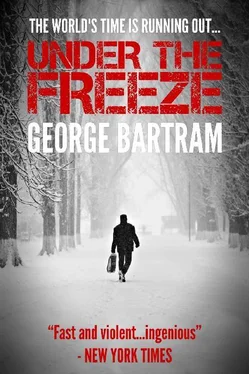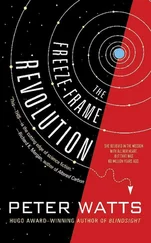“It will be a great pleasure for me.”
“Don’t count your chickens before they hatch.” She looked at the buses and the crowd, her arms still folded, her face twisted by a frown. “How are you getting back to Havana?” she asked.
“A friend is picking me up.”
“When?”
He lied. “Ten-thirty.”
“But it is long past that!”
“It can’t be.”
“It is after eleven!” She held a brown wrist up for him to study. “See?”
Tarp frowned. He meant only to look like a man who was annoyed with himself; his frowns, however, inevitably looked far more serious than that.
“Don’t be angry,” she said softly.
“I am not angry.”
“You look angry. Terribly angry.”
“Not at all.” He rubbed the lines between his brows. “Only at my own stupidity.”
“Have you money?”
He frowned again. She winced. “I left everything in his car,” he said. “A walk on the beach — no need to take anything — well, what a fool I am! If my superiors hear of this…”
“Typical Russian,” she said.
“I beg your pardon!”
“You all go crazy in the sun. Well, come on.” She grabbed his short left sleeve and tugged. “I will find you a ride, sun-struck Russki. Come along!”
“Can I ride with you?”
“Certainly not! These young Americans have antennae like oversexed roosters; they would giggle and gossip and I would lose my authority with them. What little authority it is possible to have with them! You will ride in the other bus.”
“But I will see you tonight?”
“Yes, yes, in front of the Theatre of Revolutionary Culture.”
“How will I find you?”
“I will find you. You are so tall, you will stick up like a signal for yourself. Come on.”
There were two militia men in the back of the second bus, which was rather old and which put out a cloud of diesel smoke as it racketed down the highway toward Havana. The militia men were from a Havana suburb, and they carried holstered pistols, but they were less threatening than two American deputy sheriffs might have been. Tarp sat with them and chatted whenever the bus slowed enough so that they could hear each other.
“You like Cuba?” one of them said.
“Oh, yes. The finest country in Latin America!”
They smiled shyly, as if Cuba were their personal triumph.
“You are from Moscow?”
“No, no, the Ukraine.”
“I studied that in school. I have been to school, of course. Before the revolution, a man like me, he would never have been to school. Now, I can write, and I read the announcements to my block committee. The Ukraine is the breadbasket of Russia.”
“That’s very good,” Tarp said in his Russian-accented Spanish. He did not say what he really thought — that the breadbasket of Russia was in Iowa.
They passed through clean little towns, then through a development of semi-detached concrete houses that would have reminded him of Moscow because of their sameness if they had not been painted in pretty pastels and if there had not been chickens and mules in the minuscule front yards. He waved a hand at them. “Cuba is very picturesque,” he said.
“Cuba is very clean ,” one of the militia men corrected him.
“All of it?”
“All except Buena Ventura.” The man smiled shyly. Then he guffawed a little nervously, and his companion elbowed him and they both giggled.
“What is Buena Ventura, please?”
“Buena Ventura is the place that does not officially exist.”
The man’s companion looked disgusted. “He is a thug,” he said. “He has no manners. He should not have said that.”
“I see.”
The first man was enjoying being bad, however. “Buena Ventura is more carefully hidden than Fidel’s bald spot,” he said. He giggled again. The other man shushed him, then turned away and stared out the window as if he were trying to disassociate himself from his unruly friend. Clearly it had occurred to him that Tarp might make a report of the conversation. (It had already occurred to Tarp that they might make a report on him. There was nothing he could do about that.)
“What is Buena Ventura?” he said. “Come, come, I am a man of the world.”
The first man had gotten scared now. He closed his mouth very tightly and shook his head.
“It is very unfair to introduce a subject and then not continue it, Comrade,” Tarp said. “A person would think there was something to hide.”
The second man turned on the first. “You see?” he said loudly. “What a mouth!” He waved his hands at Tarp. “The first thing that comes into his head, he says it — out it comes, just like vomit. Disgusting!” He folded his arms and scowled at the other militia man. “See what you have done now, you and your mouth? Now a foreigner has formed a bad opinion of the revolution. What is that between your ears, a rock?” He swung back to look at Tarp. “Buena Ventura is a slum. Eh? That is very plainspoken, no? A slum — dirty, poor, mean, crooked — the works. The revolution has passed it by. Why? Because the people are incorrigibles. They should have been sent to the United States, but we could not get them to the boats fast enough. In my block committee, we have had a paper about Buena Ventura. As a bad example. Buena Ventura is famous. In a very bad sort of way.”
“Maybe the revolution needs Buena Ventura to remind itself of what it triumphed over.”
The man looked at Tarp with respect. “That is pretty good. May I repeat that at my block committee?”
“I am flattered. But let me be honest, my friend. Even in the Soviet Union, we have slums. One or two. Socialism is a stage, after all. It is not perfection. Eh? There are always backsliders who betray the best interests of the people.”
The first man was grinning. He had round cheeks, like Ping-Pong balls. “You can get girls in Buena Ventura,” he said.
“Oh, sweet Jesu,” the second one said. “Will you ever shut up?”
“You can get anything in Buena Ventura.” He swung an arm over the shiny, greasy metal tubing that formed a handhold over the back of the seat and faced Tarp. “Colombian cocaine, they say. Truly. Gambling. Cockfights. There are degenerates in Buena Ventura.” He leaned back, looked around the bus, leaned toward Tarp again. “You can really have a good time, they say.” He leaned back again, then again leaned forward and said, “Get me?”
“I get you.”
The man grunted. He smiled at his friend as if he were sure he had done exactly the right thing after all, for now the Russian comrade would know the real facts of the revolution. He seemed quite pleased with himself.
The bus did not slow again long enough for them to talk, and they were all quiet. The two militia men got off near their suburb and then stood by the road, arguing with each other as the bus pulled out of sight.
Tarp went forward and asked the driver how close he went to Buena Ventura.
The black driver looked at him with cynical amusement. “About half-a-mile walk, man.”
“Let me out when you are closest to it.”
“Keep everything in your pants, man.” The black man shot him a look. “I mean your money, you follow?”
Fifteen minutes later he waved to Tarp and brought the bus to a stop. “Don’t believe the first kid tells you his mother’s a virgin and you can have her for ten pesos,” he said.
“Should I believe the second one?”
“I think he lies a little, too. Have a good time, man.”
Tarp got down from the bus and the door folded up behind him. He waved, but the driver was already looking at the road ahead, and he roared away with a belching of diesel smoke that left Tarp coughing.
Читать дальше












